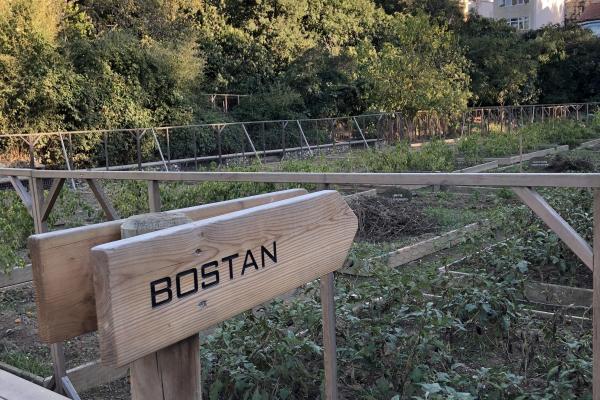
OSU's Middle East Studies Center (MESC), Global Water Institute (GWI), and University Libraries are partnering to host an in-person food sovereignty workshop on October 13th and 14th, 2022 focusing on Community-Centered Approaches for Food Systems Transformation. Globally, 27% of people faced moderate or severe food insecurity in 2019, representing more than 2 billion people. Food sovereignty is especially urgent for indigenous communities worldwide, many of whom continue to bear the burdens of displacement from their native lands. For example, 1 in 4 Native Americans in the U.S. is food insecure (Stanger-McLaughlin et al., 2021).
The purpose of the workshop is to shed light on research and grassroots projects that address this urgent crisis, highlighting the work currently being done by communities around the world to produce nutrition-dense, culturally relevant cuisine. The workshop's objective is to generate discussion and action supporting meaningful food sovereignty projects. “Food Sovereignty: Community-Centered Approaches for Food Systems Transformation” will represent local/global perspectives, highlighting Yemen and other regions of the world in addition to current food sovereignty practices of the Menominee Tribal College in Wisconsin.
The workshop will explore how the assets local communities bring to these projects can transform research. Speakers will share diverse examples of what working towards food sovereignty can look like. A variety of practices and contexts, including historic food production, projects in urban areas, and cross-cultural interdisciplinary partnerships will be addressed. If you are interested in the cultural contexts of local food systems and exploring cross-cultural, community-partnered fieldwork, this workshop is for you!
Thursday's program will include an example of a current food sovereignty project, examine historic practices, and take insights from different locations and world regions. Dr. Brandy Phipps, Research Assistant Professor of Food, Nutrition, and Health – Agriculture Research Development Program, Central State University will serve as the workshop's keynote, focusing on the SUSHI food sovereignty project she is leading in partnership with the Menominee Tribal College of Wisconsin. Dr. Phipps is an inspiring model of leadership. Learn more about her work in this short video. It will take place at the Main Library, 11th Floor.
Roundtable speakers:
Brian Kowalkowski
Department of Continuing Education
College of Menominee Nation
Daniel Varisco
President, American Institute for Yemeni Studies
Anthropologist, Historian
Kareem M. Usher, Ph.D.
Assistant Professor
College of Engineering / Austin E. Knowlton School of Architecture City and Regional Planning Section
Moderator:
Mary Rodriguez
Associate Professor
Department of Agricultural Communication, Education, and Leadership
Friday's program will focus on building projects that focus on communities and their unique assets. Conversations begun on Thursday will be continued as we delve into specific community-research partnership opportunities, and find new pathways within existing projects. These conversations will take place at the STEAM Factory. Community members and practitioners are invited to join faculty members in the discussions. Their lived experiences with either food insecurity or food sovereignty practices are highly valuable.
Scientists, economists, historians, public health experts, etc., are welcome! We will consider how food systems, eco-systems, cultures, and economies are mutually sustaining. Speakers from communities in the U.S., the Middle East, and other parts of the world will share their work on food sovereignty and what it means, both in its local context and implications for the rest of the world. Topics for discussion will follow this framework:
- Achieving nutrient density and health outcomes through food sovereignty projects while addressing historic inequities.
- Sustaining culturally relevant food sovereignty through effective collaboration, ethical knowledge sharing, and education.
- What makes successful cross-cultural partnerships, and the best results in terms of knowledge, prosperity, and health outcomes.
The speakers will discuss what food sovereignty means to their cultural heritage and the role cross-cultural partnerships may play. We will therefore be looking at examples of both cross-cultural community building and transdisciplinary collaboration. We will follow up the workshop with action steps such as grant writing, educational activities, and support for food sovereignty work locally and in other parts of the world. Will you join us? Hold your spot now: mesc.osu.edu/form/food-sovereignty-workshop-regist
Find additional details at the Middle East Studies Center's event page.
This food sovereignty workshop is brought to you by a partnership between University Libraries, the Global Water Institute, and the Middle East Studies Center. The partnership with the Growing and Growth Collective supports this workshop and the film series on Food Sovereignty that the Middle East Studies Center will be co-hosting (More details coming!). Co-sponsors include the Newark Earthworks Center with a grant from the OSU Indigenous Arts & Humanities (IAH) / Global Arts & Humanities (GAH) Discovery Theme, the STEAM Factory, the Department of Anthropology, the Department of Comparative Studies, the Department of Food, Agricultural and Biological Engineering, the Knowlton School of Architecture, the Center for Latin American Studies, and the CFAES Rattan Lal Center for the Study of Carbon Management and Sequestration (C-MASC).
